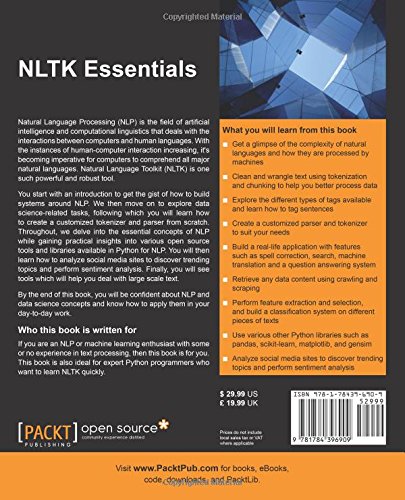|
 
Publisher: Packt Publishing (July 27, 2015)
Language: English
ISBN-10: 1784396907
ISBN-13: 978-1784396909
Build cool NLP and machine learning applications using NLTK and other Python libraries
About This Book
Extract information from unstructured data using NLTK to solve NLP problems
Analyse linguistic structures in text and learn the concept of semantic analysis and parsing
Learn text analysis, text mining, and web crawling in a simplified manner
Who This Book Is For
If you are an NLP or machine learning enthusiast with some or no experience in text processing, then this book is for you. This book is also ideal for expert Python programmers who want to learn NLTK quickly.
What You Will Learn
Get a glimpse of the complexity of natural languages and how they are processed by machines
Clean and wrangle text using tokenization and chunking to help you better process data
Explore the different types of tags available and learn how to tag sentences
Create a customized parser and tokenizer to suit your needs
Build a real-life application with features such as spell correction, search, machine translation and a question answering system
Retrieve any data content using crawling and scraping
Perform feature extraction and selection, and build a classification system on different pieces of texts
Use various other Python libraries such as pandas, scikit-learn, matplotlib, and gensim
Analyse social media sites to discover trending topics and perform sentiment analysis
In Detail
Natural Language Processing (NLP) is the field of artificial intelligence and computational linguistics that deals with the interactions between computers and human languages. With the instances of human-computer interaction increasing, it's becoming imperative for computers to comprehend all major natural languages. Natural Language Toolkit (NLTK) is one such powerful and robust tool.
You start with an introduction to get the gist of how to build systems around NLP. We then move on to explore data science-related tasks, following which you will learn how to create a customized tokenizer and parser from scratch. Throughout, we delve into the essential concepts of NLP while gaining practical insights into various open source tools and libraries available in Python for NLP. You will then learn how to analyze social media sites to discover trending topics and perform sentiment analysis. Finally, you will see tools which will help you deal with large scale text.
By the end of this book, you will be confident about NLP and data science concepts and know how to apply them in your day-to-day work.
|

